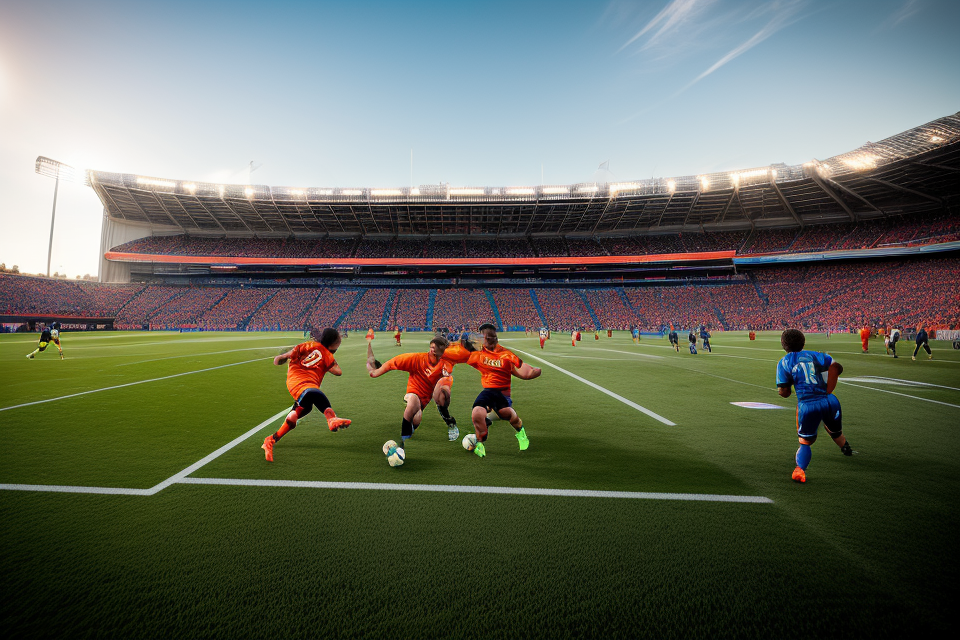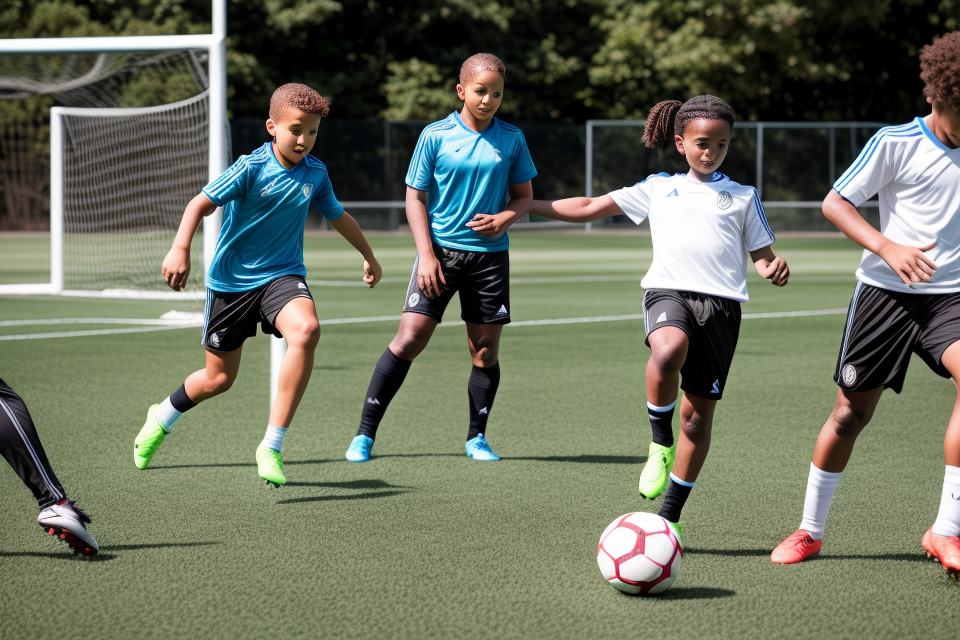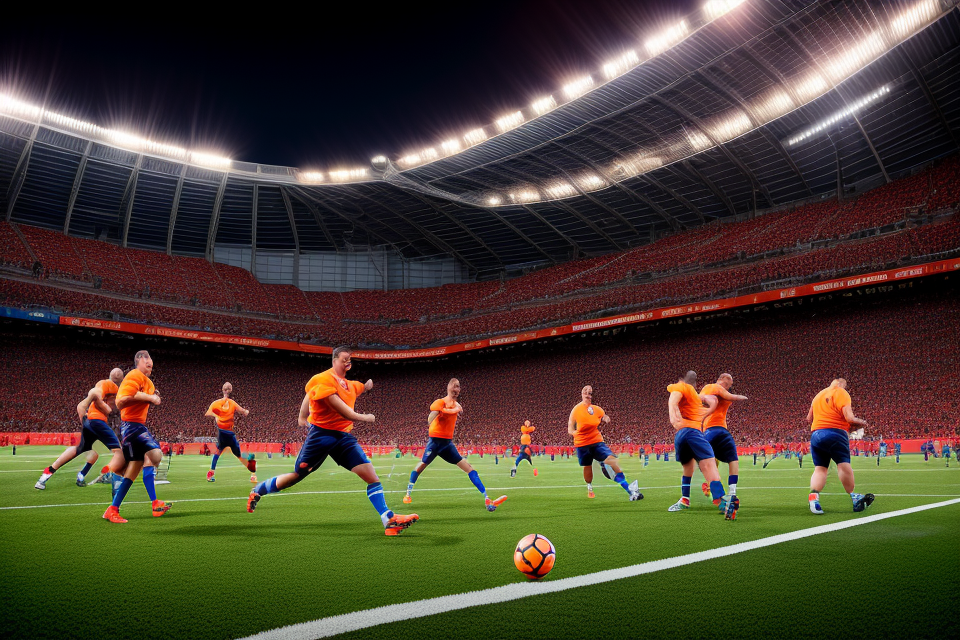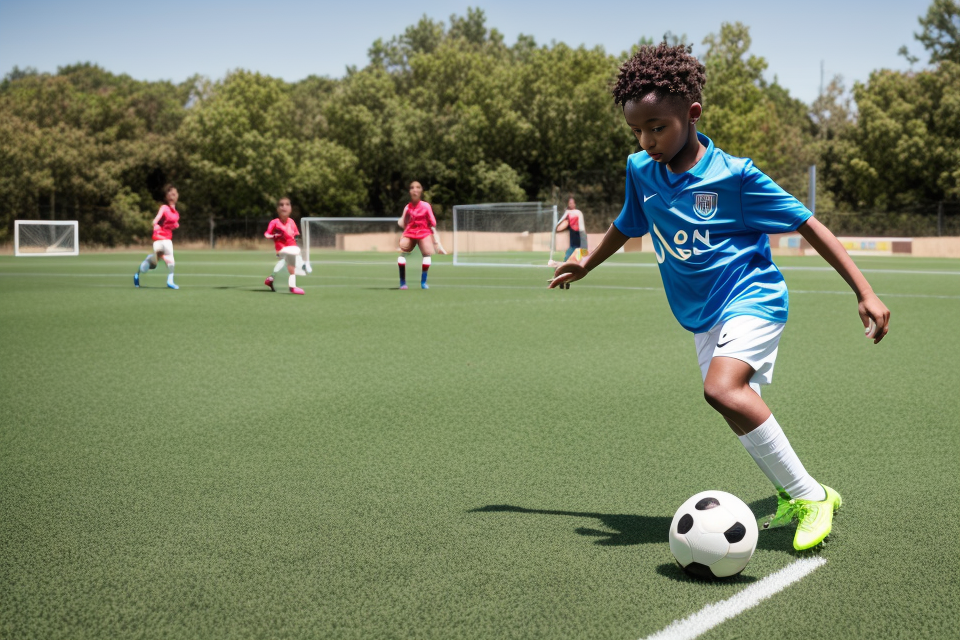Soccer is a sport that requires dedication, hard work, and practice to become proficient at. If you are a beginner looking to improve your skills, then this article is for you. Here, we will provide you with some valuable tips that will help you become a skilled soccer player. From improving your ball control to developing your shooting skills, we will cover all the essential aspects of the game. So, let’s get started and take your soccer game to the next level!
Develop Basic Skills
Ball Control
Dribbling
Dribbling is the act of controlling the ball while running with it. It is an essential skill for any soccer player as it allows them to maneuver around opponents and gain access to the goal. To improve dribbling skills, start by practicing with a small ball, focusing on changing direction quickly and keeping the ball close to the body. As you progress, you can move on to a larger ball and incorporate moves like fakes and step-overs to make it more challenging.
Ball touches
Ball touches refer to the number of times a player touches the ball during a game. In order to become a skilled soccer player, it is important to touch the ball as much as possible. This helps with ball control, passing, and shooting. To improve your ball touches, try to always be in a position to receive a pass and attempt to control the ball as soon as it reaches you.
Receiving and controlling the ball
Receiving and controlling the ball is a crucial aspect of soccer. It involves catching the ball with the appropriate part of the body and then controlling it with the feet, thighs, or chest. To improve your receiving and controlling skills, practice receiving the ball with different parts of your body and try to bring it to a stop immediately after. Additionally, try to control the ball while it is in the air and use different body parts to direct it to the desired location.
Passing
When it comes to becoming a skilled soccer player, passing is an essential aspect that must be mastered. Here are some tips to help beginners improve their passing skills:
Short passing
Short passing involves passing the ball to a teammate within a short distance. To improve your short passing, practice dribbling with the ball while maintaining control and accuracy. You should also focus on your foot-eye coordination and aim to strike the ball with the inside or outside of your foot, depending on the situation.
Long passing
Long passing, on the other hand, involves passing the ball over a longer distance. To improve your long passing, practice kicking the ball with power and accuracy, using either your instep or laces. It’s important to keep your non-kicking foot behind your body for balance and to use your arms to guide the ball towards your target.
Accuracy and precision
Regardless of the type of passing, accuracy and precision are crucial for successful soccer passes. To improve your accuracy, practice focusing on your target and aiming for specific spots on the field. You should also work on your technique, including your foot positioning, ball contact point, and follow-through.
Additionally, it’s important to understand the different types of soccer passes, such as through-balls, square passes, and lofted passes, and when to use them in game situations. Practicing different types of passes in various situations will help you become a more well-rounded soccer player and improve your overall passing skills.
Shooting
Technique
- Stand with your feet shoulder-width apart, with the ball in front of you.
- Bend your knees slightly and lean forward, keeping your weight on the balls of your feet.
- Bring your dominant foot towards the ball, placing it slightly ahead of the ball.
- Use your non-dominant foot to kick the ball, keeping it close to your body.
- Follow through with your dominant foot, pointing it towards the goal.
Power
- Start by practicing shooting with your non-dominant foot.
- Gradually increase the speed and power of your shots as you become more comfortable.
- Use your legs and core muscles to generate power, rather than just your arms.
- Aim to strike the ball with the inside or laces of your foot, depending on the shot.
Accuracy
- Focus on striking the ball with the sweet spot, which is the area of the ball that produces the most power and accuracy.
- Practice shooting at different angles and distances to improve your accuracy.
- Pay attention to your body position and alignment, making sure your feet, hips, and shoulders are all facing the target.
- Avoid using your arms too much, as this can affect the accuracy of your shots.
Improve Your Speed and Agility
Flexibility and mobility
As a soccer player, having good flexibility and mobility is crucial for your performance on the field. Flexibility refers to the range of motion of your joints, while mobility refers to the ability of your joints to move through that range of motion. Both are important for soccer players, as they require a wide range of movements, including running, jumping, and changing direction quickly.
To improve your flexibility and mobility, you can incorporate stretching exercises and agility drills into your training routine.
Stretching Exercises
Stretching exercises are a great way to improve your flexibility. You can perform stretches for different muscle groups, including your hamstrings, quadriceps, calves, and hip flexors. To perform a stretch, hold the stretch for 15-30 seconds and repeat for 2-3 sets. Make sure to stretch to the point of tension, but not pain.
Some effective stretching exercises for soccer players include:
- Hamstring stretch: Stand with your feet hip-width apart and lean forward from your hips, keeping your back straight. Clasp your hands behind your back and hold the stretch for 15-30 seconds.
- Quadriceps stretch: Stand with one foot forward and the other foot back, with your hands on your hips. Lean forward from your hips, keeping your back straight, until you feel a stretch in your front thigh. Hold the stretch for 15-30 seconds.
- Calf stretch: Stand facing a wall with one foot forward and the other foot back. Place your hands on the wall and lean forward, keeping your back straight, until you feel a stretch in your calf. Hold the stretch for 15-30 seconds.
- Hip flexor stretch: Kneel on one knee with the other foot out in front of you. Lean forward from your hips, keeping your back straight, until you feel a stretch in your hip flexor. Hold the stretch for 15-30 seconds.
Agility Drills
Agility drills are designed to improve your mobility and explosiveness. They can help you improve your speed, balance, and coordination, which are all important skills for soccer players. Some effective agility drills for soccer players include:
- Cone drills: Set up a series of cones in a zig-zag pattern. Run through the pattern as quickly and accurately as possible, using your feet, legs, and hips to change direction.
- Shuffle drills: Stand with your feet shoulder-width apart and shuffle sideways as quickly as possible. Use your feet, legs, and hips to change direction and move laterally.
- Ladder drills: Set up a ladder on the ground and run through it as quickly and accurately as possible. Use your feet, legs, and hips to change direction and move up and down the ladder.
- Plyometric jumps: Perform plyometric jumps, such as box jumps or squat jumps, to improve your explosiveness and power.
Incorporating stretching exercises and agility drills into your training routine can help you improve your flexibility and mobility, which can in turn improve your performance on the soccer field.
Cardiovascular endurance
Cardiovascular endurance is an essential aspect of soccer as it helps players maintain high energy levels throughout the game. To improve cardiovascular endurance, it is crucial to engage in running exercises and interval training.
Running Exercises
Running exercises are a great way to improve cardiovascular endurance. They help in increasing the efficiency of the heart and lungs, allowing the body to take in more oxygen and deliver it to the muscles. Running exercises also help in strengthening the leg muscles, which is crucial for soccer players. Some running exercises that can be incorporated into a training regimen include:
- Long-distance running: This involves running for an extended period, such as 30 minutes to an hour. It helps in improving cardiovascular endurance and building stamina.
- Interval running: This involves running for short periods, such as 30 seconds to a minute, followed by a rest period. It helps in improving cardiovascular endurance and increasing speed.
- Hill running: This involves running up and down hills. It helps in building leg strength and improving cardiovascular endurance.
Interval Training
Interval training is a form of high-intensity training that involves alternating between periods of high-intensity exercise and periods of rest or low-intensity exercise. It is an effective way to improve cardiovascular endurance and increase speed. Some interval training exercises that can be incorporated into a training regimen include:
- Sprint interval training: This involves alternating between periods of sprinting and resting. It helps in improving cardiovascular endurance and increasing speed.
- Resistance interval training: This involves alternating between periods of high-intensity resistance training and periods of rest or low-intensity resistance training. It helps in building muscle strength and improving cardiovascular endurance.
Incorporating these running exercises and interval training exercises into a training regimen can significantly improve cardiovascular endurance, leading to better performance on the soccer field.
Strength training
To become a skilled soccer player, it is essential to improve your speed and agility. One way to achieve this is by incorporating strength training into your workout routine. Resistance training, plyometrics, and other exercises can help you build the muscle strength and power needed to perform at your best on the field.
Resistance training
Resistance training is a type of strength training that involves working against a force to build muscle strength and endurance. There are many different types of resistance training exercises that can benefit soccer players, including:
- Weightlifting: Lifting weights can help you build muscle strength and power in your legs, which is essential for sprinting and changing direction quickly on the field.
- Bodyweight exercises: Exercises like squats, lunges, and push-ups can help you build muscle strength in your legs, core, and upper body, which can all contribute to better performance on the field.
- Resistance bands: Resistance bands are a great option for soccer players who want to improve their strength and flexibility without using heavy weights. They can be used to perform a variety of exercises that target different muscle groups.
Plyometrics
Plyometrics are exercises that involve explosive movements and jumping. They are designed to improve your power and speed, which can help you perform better on the field. Some examples of plyometric exercises include:
- Box jumps: These involve jumping up onto a box or bench and then jumping down again. They can help you improve your leg power and vertical jump.
- Depth jumps: These involve dropping down into a squat position and then jumping up explosively. They can help you improve your lower body power and speed.
- Medicine ball slams: These involve throwing a medicine ball against a wall or floor and then catching it. They can help you improve your upper body power and explosiveness.
By incorporating resistance training and plyometrics into your workout routine, you can improve your muscle strength and power, which can help you become a more skilled soccer player.
Enhance Your Soccer IQ
Game awareness
Positioning
Positioning is a crucial aspect of soccer that refers to the way players position themselves on the field in relation to the ball and their teammates. Proper positioning allows players to make better decisions, intercept passes, and create scoring opportunities.
Reading the game
Reading the game involves understanding the dynamics of the match and anticipating what is likely to happen next. This skill involves analyzing the movement of the ball, the position of teammates, and the behavior of opponents. Players who can read the game effectively can anticipate opponents’ moves and react accordingly.
Anticipating opponents’ moves
Anticipating opponents’ moves involves understanding their patterns of play and predicting their next move. This skill requires a deep understanding of the game and the ability to read the body language and positioning of opponents. By anticipating opponents’ moves, players can intercept passes, create turnovers, and prevent goals.
Overall, game awareness is a critical component of becoming a skilled soccer player. By improving your positioning, reading the game, and anticipating opponents’ moves, you can become a more effective player and contribute to your team’s success.
Tactical knowledge
In order to become a skilled soccer player, it is important to possess a high level of tactical knowledge. This includes understanding different formations, movement off the ball, and attacking and defending strategies.
- Formations: Familiarize yourself with common formations such as 4-4-2, 3-5-2, and 4-3-3. Understand the roles of each position on the field and how they work together in order to achieve a common goal.
- Movement off the ball: Learn how to make runs off the ball to create space and opportunities for your teammates. Understand the importance of timing and movement to be in the right place at the right time.
- Attacking and defending strategies: Understand the principles of attacking and defending, such as keeping possession of the ball, breaking through the opponent’s defense, and stopping the opponent from scoring.
By gaining a deeper understanding of tactical knowledge, you will be able to make more informed decisions on the field and help your team achieve success.
Mental toughness
Becoming a skilled soccer player is not just about physical prowess, it also requires mental toughness. This involves building confidence, managing emotions, and maintaining focus. Here are some tips to help you develop mental toughness in soccer:
- Build Confidence: Confidence is key in any sport, and soccer is no exception. You need to believe in your abilities and have faith in your skills. One way to build confidence is to set small goals for yourself and achieve them. As you progress, you will gain more confidence, which will help you tackle tougher challenges.
- Manage Emotions: Soccer can be an emotional game, and it’s important to learn how to manage your emotions. This means controlling your anger, frustration, and anxiety. If you get angry on the field, take a break and compose yourself before returning to the game. If you’re feeling anxious, take deep breaths and focus on the task at hand.
- Maintain Focus: Soccer requires intense concentration and focus. You need to stay focused on the game, even when things don’t go as planned. This means staying positive, even when you make mistakes. It also means avoiding distractions, such as social media or text messages, while you’re on the field.
By developing mental toughness, you will be better equipped to handle the challenges of soccer and become a skilled player.
Practice and Play More Soccer
Join a team or league
One of the most effective ways to improve your soccer skills is to join a team or league. This not only provides you with regular opportunities to practice and play, but also allows you to learn from more experienced players and develop your skills in a competitive environment.
Recreational leagues
Recreational leagues are a great option for beginners who are just starting out in soccer. These leagues typically have a relaxed atmosphere and are focused on having fun and learning the game. They are a good way to get a feel for the sport and develop your basic skills before moving on to more competitive play.
Competitive leagues
Competitive leagues are designed for players who are looking for a more challenging and intense soccer experience. These leagues typically have more rigorous tryouts and are geared towards players who are looking to compete at a higher level. If you are looking to improve your skills and take your soccer career to the next level, then competitive leagues may be the right choice for you.
Pick-up games
Pick-up games are a great way to get some extra practice and play time in when you don’t have access to a formal team or league. These games are typically informal and are often played on open fields or in parks. They are a good way to stay active and develop your skills, and can also be a lot of fun.
Overall, joining a team or league is a great way to improve your soccer skills and take your game to the next level. Whether you are a beginner or an experienced player, there is a league or team out there that is right for you. So get out there and start playing!
Attend camps and clinics
Attending soccer camps and clinics is an excellent way to improve your skills and learn from experienced coaches. These events provide a structured environment for players to develop their technical abilities, tactical knowledge, and physical fitness. Here are some types of camps and clinics that can help you become a better soccer player:
- Soccer camps: Soccer camps are typically week-long programs that offer a combination of training sessions, games, and other activities. These camps cater to players of all ages and skill levels, from beginners to advanced players. At a soccer camp, you will receive personalized attention from coaches who will help you develop your individual skills, as well as your ability to play as part of a team.
- Skills clinics: Skills clinics are typically shorter in duration, lasting a day or a weekend, and focus on specific aspects of the game. For example, you might attend a clinic that focuses on dribbling, passing, or shooting. These clinics are great for players who want to improve their skills in a specific area or who are looking for a more intensive training experience.
- Position-specific training: Some camps and clinics are designed specifically for players in certain positions, such as forwards, midfielders, or defenders. These events focus on the unique skills and responsibilities associated with each position, helping players to better understand their role on the field and how to work effectively with their teammates.
By attending soccer camps and clinics, you will have the opportunity to learn from experienced coaches, train with other players who share your passion for the game, and develop your skills in a supportive and challenging environment.
Watch and learn from pros
As a beginner, one of the most effective ways to improve your soccer skills is by watching and learning from professional players. By studying the techniques and strategies of top-level players, you can gain valuable insights into how to play the game at a higher level. Here are some tips on how to do it:
- Study top-level players: Identify the top players in the world and watch their games regularly. Analyze their movements, techniques, and decision-making during the game. Take note of their strengths and weaknesses and try to incorporate their strengths into your own game.
- Analyze game footage: Watch game footage multiple times to gain a deeper understanding of the game. Focus on key moments, such as goals scored or crucial saves made by the goalkeeper. Try to identify the tactics and strategies used by the teams and how they contributed to the outcome of the game.
- Learn from their techniques and strategies: Observe the techniques and strategies used by professional players and try to incorporate them into your own game. For example, if you notice that a top player always runs with the ball towards the goal, try to do the same in your own games. Additionally, pay attention to their passing, dribbling, and shooting techniques and try to emulate them in your own practice sessions.
By watching and learning from professional players, you can gain valuable insights into how to play soccer at a higher level. Remember to always stay focused on your own development and use these observations as a guide to improve your own skills.
Incorporate feedback
As a beginner, it’s important to be open to feedback and constructive criticism from coaches, teammates, and opponents. Here are some tips on how to incorporate feedback to improve your soccer skills:
- Seek constructive criticism: Ask for feedback from your coach or more experienced teammates. They can provide valuable insights on your strengths and weaknesses, and offer suggestions on how to improve.
- Use feedback to improve: Listen to the feedback you receive and think about how you can apply it to your game. For example, if your coach suggests that you work on your ball control, make a conscious effort to practice dribbling and ball handling during your next training session.
- Be open to learning and growing: Adopt a growth mindset and embrace the idea that you can always improve. Be willing to try new things and take risks, even if it means stepping out of your comfort zone.
By incorporating feedback into your soccer practice and games, you can identify areas for improvement and continue to develop your skills over time.
FAQs
1. What are the basic skills required to become a good soccer player?
To become a skilled soccer player, one must possess certain basic skills such as good ball control, passing, dribbling, shooting, and tackling. These skills can be developed through regular practice and training.
2. How can I improve my ball control in soccer?
Improving ball control in soccer requires practice and patience. You can start by juggling the ball and practicing different types of kicks such as instep, laces, and volleys. It is also important to work on your first touch and learn to control the ball quickly and accurately.
3. What are the best drills to improve my dribbling skills?
Dribbling is an essential skill in soccer, and there are several drills that can help improve it. One effective drill is to practice changing direction quickly while maintaining control of the ball. Another drill is to dribble around cones or obstacles while focusing on close control and balance. Practicing one-on-one with a defender is also a great way to improve your dribbling skills.
4. How can I improve my passing accuracy in soccer?
Improving passing accuracy in soccer requires practice and a good understanding of the game. You can start by practicing short passes to your teammates and gradually work your way up to longer passes. It is important to focus on your technique, including your foot placement, ball positioning, and follow-through. You should also practice different types of passes, such as through-balls and crosses.
5. What are the best drills to improve my shooting technique?
To improve your shooting technique in soccer, you can practice different types of shots, such as inside, laces, and volleys. You should also work on your technique, including your stance, foot placement, and follow-through. One effective drill is to practice shooting from different distances and angles, using both feet. It is also important to learn how to shoot with both power and accuracy.
6. How can I improve my tackling skills in soccer?
Improving your tackling skills in soccer requires practice and a good understanding of the game. You can start by practicing tackling drills, such as sliding tackles and standing tackles. It is important to focus on your technique, including your body positioning, foot placement, and timing. You should also practice different types of tackles, such as interceptions and tackles from behind.
7. What are the best ways to improve my endurance and fitness for soccer?
To improve your endurance and fitness for soccer, you should engage in regular cardiovascular exercise, such as running, cycling, or swimming. You can also work on your strength and power by doing exercises such as squats, lunges, and push-ups. It is important to gradually increase the intensity and duration of your workouts over time, and to allow for proper recovery between training sessions.



